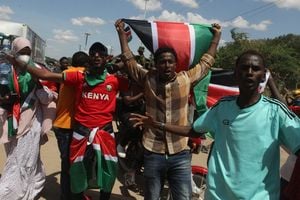NCIC boss Samuel Kobia: Lamu attacks ethnically motivated
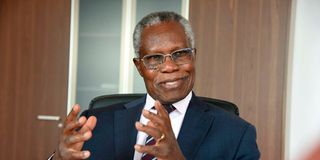
National Cohesion and Integration Commission (NCIC) Chairman Dr. Rev. Samuel Kobia during an interview at his office at Britam Towers in Nairobi on September 26, 2023.
What you need to know:
- In 2014, when more than 60 people were killed in two days in Mpeketoni, then President Uhuru Kenyatta blamed "local political networks" for the violence.
- NCIC chairman Prof Samuel Kobia also explains the reasons for the recent flare-up of conflict along the Kisumu-Kericho border.
The National Cohesion and Integration Commission (NCIC) says their investigations indicate most killings in Lamu County are ethnically motivated with only a few opportunistic attacks by Al Shabaab terrorists.
NCIC says land disputes are stoking the conflict in the county, located in the northern coast of Kenya, intended to displace a particular community blamed by locals for dominance economically and politically.
The planned redistribution of 21 ranches, including one measuring 43,000 acres owned by absentee landlords to settle the landless, is behind the tribal attacks, the NCIC says.
And the perception that land speculators from outside the county reaped big from state compensation for the Lamu Port, South Sudan, Ethiopia Transport Corridor (Lapsset) is also fueling attacks on contractors undertaking the mega infrastructure project.
In 2014, when more than 60 people were killed in two days in Mpeketoni, then President Uhuru Kenyatta blamed "local political networks" for the violence, saying members of one ethnic group were targeted.
"The attacks were "well planned, orchestrated and politically motivated ethnic violence against against a Kenyan community, with the intention of profiling and evicting them for political reasons," President Kenyatta said in a national address at the time.
"This therefore was not an al-Shabab attack," he added. "Evidence indicates that local political networks were involved in the planning and execution of a heinous crime".
In an interview with the Nation, NCIC chairman Prof Samuel Kobia also explains the reasons for the recent flare-up of conflict along the Kisumu-Kericho border, clan wars in Garissa and why the guns may ultimately fall silent in banditry-scarred Baragoi. Here are excerpts of the interview:
There seems to be an upsurge in ethnic animosity in the country with the killings along the border between Kisumu and Kericho, clan wars in Garissa, terror in Lamu and hatred on social media. Are we back to the state we were in, in 2007?
The situation has not deteriorated in the whole country, generally.
I think there has been improvement but there are these hotspots where it has actually deteriorated to below the levels the country was in in 2007.
I think Lamu is where people think sometimes it's Al shabaab and the Mombasa Republican Council who are behind some of these killings in Lamu but there is also the ethnic dimension to it.
The indigenous people feel that people have come from other parts of the country, especially Central Kenya, and taken over not only business but also politics so there is that bitterness.
What is now worrying us is now the sheer brutality that is going on. We have decided to have a meeting with elected officials from Lamu alongside three parliamentary committees and the Ministry of Interior to see how to help this situation.
Nevertheless, the situation is more complex than that. There are 21 ranches in Lamu, (one of them is 43,000 acres) all of which are owned by absentee land owners.
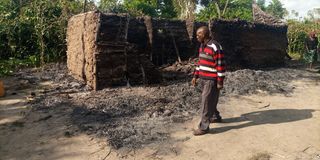
One of the houses that was burned by suspected Al Shabaab militants in Salama Block 17 village in Lamu County on Wednesday, July 12.
Only one has a title deed, the rest have letters of allotment. 14 of the 21 ranches were revoked by President Uhuru Kenyatta so that land could be distributed to the landless people there but this never happened and remains one of the bitterness the people there have.
When I visited there, what they told me is they wished this happened during the time of the former President. They want to see the Kenya Kwanza government take this up.
The other bitterness is the LAPSSET corridor program. The project starts in Lamu and they say that because they are not as well informed as the people from outside the county, there has been a lot of speculation that compensation for land in millions of shillings has not gone to the local people.
So this explains why we are seeing some killings along that corridor?
Yes, absolutely.
The third complaint that has been made to us is that the LAPSSET program has promised to offer scholarships and bursaries to the children of the local people but this was not done.
Even though we have said it is not Al shabaab or MRC, even they are taking advantage of the grievances because one of the victims, one of the women whose husband was butchered in front of her and her children, said that the culprits told her the reason they have done this is for her to tell the government that if it does not get out of Somalia, it will not stop.
If the government addresses these grievances and the levels of ethnic hatred go down, are we likely to see a reduction in incidents where Improvised Explosive Devices are planted targeting security forces in Lamu?
Yes. Because you see Al shabaab are very opportunistic. I think the decision to have a road through Boni Forest is going to help a lot because that forest is very big and once they disappear into it, it’s very difficult to pursue them.
If you would give the situation in Lamu a percentage, is it 90 per cent ethnic violence and 10 pe rcent terror or 70:30?
I would say, 75 per cent ethnic violence and 25 per cent terror.
What about the situation in Sondu?
Sondu basically is a border issue. They complain that they lack a clear demarcation. There was a time the people from Kericho crossed over and even developed part of the land which is actually in Kisumu and they have since insisted on staying there.
The Kisumu people lay claim to the land but they also cannot show where the demarcation is. We want that demarcation done by the Survey of Kenya.
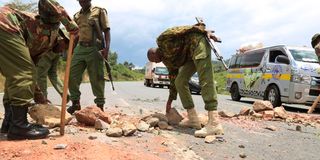
When the issue of Kakamega-Nandi was sorted out, Kisumu-Kericho was next but Covid 19 happened so we did not pursue it immediately after that. Then elections came but now we are taking it up.
Why a resurgent of clashes now?
It is because of the elections and (anti-government) demonstrations
What of the clan issues in Garissa?
The Somali are the most harmonious people in the country, one language, one religion, one culture but when it comes to clannism, sometimes it is deeper than even tribalism. This is where the problem is and again even here the issue of demarcation also comes in.
We were able to deal with the issue in Mandera by having a peace agreement which is holding but in Garissa the problem is compounded by some of the clans’ complaints that there are families within them that dominate and control politics.
The political angle to it is between Garissa and Tana River where they say that during the electioneering period, politicians get voters from Tana River to vote in Garissa.
Every year the commission commemorates the International Day of peace with a peace building activity. What happened this year?
This year we decided to commemorate in Baragoi in Samburu to demonstrate that peace has come to Baragoi because once that name is mentioned people remember deaths and banditry courtesy of the Baragoi Massacre. By daring to go there, we wanted to demonstrate that peace is possible anywhere and everywhere in Kenya. We ended up having one of our best events.
The reason of course why we were able to go in and out is because of the success of the operation by the police and Kenya Defence Forces (KDF). The guns have gone silent and the raids reduced considerably.
Operations have happened before when bandits retreated and resurfaced after, how do you ensure that peace is lasting in that area?
This time we have agreed with the Ministry of Interior that there will be an interface between the kinetic operation with soft approaches which promote healing and reconciliation from decades of emotional and psychological wounds and trauma suffered by those that have lost their loved ones.
We have been working with elders in all parts of Samburu on several peace initiatives including having them talk to morans to end banditry.
We have met hundreds of morans in this initiative and they assured us that if we avail alternative sources of livelihood, they will be willing to abandon banditry.
We trusted what they said and approached the Minister of Cooperatives who said he will avail capital from various funds including the Hustler Fund. After that, we realised that the majority have not gone to school, some are secondary and primary school drop outs.
The minister advised that they organise themselves into groups and with that understanding we launched Warani SME groups in Baragoi on September 21 together with the ministries of Cooperatives and Education because we want to have tailor made courses for these morans so that at least they can have very basic skills.
There is a proposal to build roads and schools along the borders between warring communities. Do you think that will help nurture a generation of children that does not bear the trauma that their parents have?
These projects are very important here. Those schools will have children from all the communities, the Samburus, the Turkanas, the Maasai from the lower parts of the Rift Valley and the Pokots. When they come together, they will begin to understand each other in a way that they wouldn’t have.
We are also proposing the establishment of markets along the border where women from both sides can sell their produce on alternate days. This worked along the Nandi-Kakamega border where women used to have different market days on either side of the border.
Another avenue that we recommend is youth participation in sports. We have had this work in Isiolo where the Boranas, Meru, Turkana, Samburu and Somalis have organized teams that engage in peace tournaments.
A new bill is in the offing to give NCIC fangs to bite hate mongers. The bill is proposing a change of the commission's name. Why is that important?
We are not really recommending a change to the name, what we are recommending is an amendment to the bill that will give NCIC more powers. The change of name is not coming from us as NCIC, it’s from some politicians.
We want the new act to address gaps in the Act and expand NCIC’s mandate to current realities by expanding the definition of hate speech. Currently, it is not broad enough and spares some hate speech mongers. For example, we need to include social media in the Act because it does not cater to that.
We also want to criminalise vilification of others and use of certain coded language, innuendos and parables in local languages. Some of this happens mainly on FM radio stations.
The Act also proposes a ban on use of ethnic languages in public offices, those spaces should operate in English or Swahili and for those that do not understand the two, an interpreter should be provided.
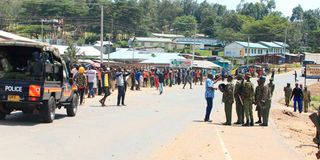
Police provide a buffer zone between warring youth during clashes at Sondu, Kisumu on July 13, 2023. Following inter-community clashes at the common Sondu border, at least 13 people suffered arrow wounds with a high-level security meeting called to quell the chaos.
We also want to include penal sanctions to discrimination in employment because our ethnic audit of the counties has revealed that only 13 counties have complied with the 30:70 employment requirement of minority to majority ethnic communities. In many counties 90 per cent of employees belong to one community.
We further want NCIC to be given the role of vetting individuals running for elective seats and those nominated for public offices.
Lastly, compliance mechanisms for the Act have been lacking. We want the commission to have its own detectives. Of course we have investigators who are seconded to us by the Directorate of Criminal Investigations.




